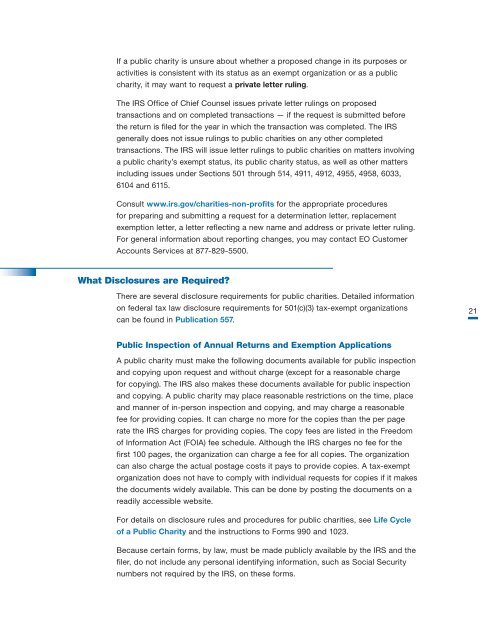The Nonprofit Incubator
The Nonprofit Incubator
The Nonprofit Incubator
You also want an ePaper? Increase the reach of your titles
YUMPU automatically turns print PDFs into web optimized ePapers that Google loves.
If a public charity is unsure about whether a proposed change in its purposes or<br />
activities is consistent with its status as an exempt organization or as a public<br />
charity, it may want to request a private letter ruling.<br />
<strong>The</strong> IRS Office of Chief Counsel issues private letter rulings on proposed<br />
transactions and on completed transactions — if the request is submitted before<br />
the return is filed for the year in which the transaction was completed. <strong>The</strong> IRS<br />
generally does not issue rulings to public charities on any other completed<br />
transactions. <strong>The</strong> IRS will issue letter rulings to public charities on matters involving<br />
a public charity’s exempt status, its public charity status, as well as other matters<br />
including issues under Sections 501 through 514, 4911, 4912, 4955, 4958, 6033,<br />
6104 and 6115.<br />
Consult www.irs.gov/charities-non-profits for the appropriate procedures<br />
for preparing and submitting a request for a determination letter, replacement<br />
exemption letter, a letter reflecting a new name and address or private letter ruling.<br />
For general information about reporting changes, you may contact EO Customer<br />
Accounts Services at 877-829-5500.<br />
What Disclosures are Required?<br />
<strong>The</strong>re are several disclosure requirements for public charities. Detailed information<br />
on federal tax law disclosure requirements for 501(c)(3) tax-exempt organizations<br />
can be found in Publication 557.<br />
21<br />
Public Inspection of Annual Returns and Exemption Applications<br />
A public charity must make the following documents available for public inspection<br />
and copying upon request and without charge (except for a reasonable charge<br />
for copying). <strong>The</strong> IRS also makes these documents available for public inspection<br />
and copying. A public charity may place reasonable restrictions on the time, place<br />
and manner of in-person inspection and copying, and may charge a reasonable<br />
fee for providing copies. It can charge no more for the copies than the per page<br />
rate the IRS charges for providing copies. <strong>The</strong> copy fees are listed in the Freedom<br />
of Information Act (FOIA) fee schedule. Although the IRS charges no fee for the<br />
first 100 pages, the organization can charge a fee for all copies. <strong>The</strong> organization<br />
can also charge the actual postage costs it pays to provide copies. A tax-exempt<br />
organization does not have to comply with individual requests for copies if it makes<br />
the documents widely available. This can be done by posting the documents on a<br />
readily accessible website.<br />
For details on disclosure rules and procedures for public charities, see Life Cycle<br />
of a Public Charity and the instructions to Forms 990 and 1023.<br />
Because certain forms, by law, must be made publicly available by the IRS and the<br />
filer, do not include any personal identifying information, such as Social Security<br />
numbers not required by the IRS, on these forms.

















